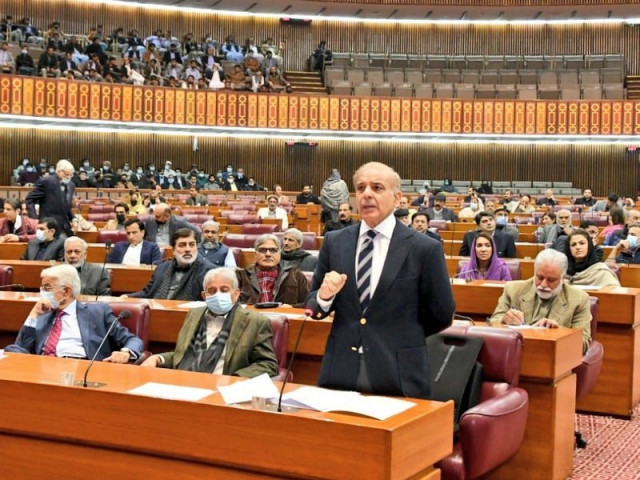Opposition relying on PTI defections
PML-N, PPP step up efforts for in-house change after security establishment’s signal that it will remain 'neutral'

The opposition is eyeing defections within the ruling PTI instead of support from its allies -- the PML-Q and MQM-P -- for an in-house change at the Centre as well as in Punjab.
The PML-N and PPP have agreed on mounting joint efforts to bring an in-house change in parliament and the Punjab Assembly after receiving a signal from the security establishment that it would remain 'neutral' in such an event.
The PML-N does not want Prime Minister Imran Khan to be given time to appoint the new army chief in September or October.
Talking to the media, PML-N Vice President Maryam Nawaz also endorsed the perception that the security establishment was willing to play a neutral role.
There is an understanding in political circles that if the in-house move succeeds in Punjab, then the chief minister in the country’s biggest province would be from the PML-N, while the PPP would field its candidate for the prime minister’s slot.
Sources told The Express Tribune that the opposition was relying on defections in the PTI, rather than winning over the support of the government's allies.
They revealed that around two-dozen PTI MNAs, as well as the party’s MPAs in Punjab, were in contact with the PML-N for tickets for the next elections.
It has also been learnt that more than a dozen PTI MNAs voted for Yousuf Raza Gilani in the Senate election after receiving an assurance from the PML-N that they would be awarded party tickets in the next elections.
A list of around two dozen PTI MNAs were sent to PML-N supremo Nawaz Sharif, who scrutinised them and authorised the party to assure them of party ticket in the next elections.
Internally, the PTI is facing a severe management crisis.
Around two dozen MNAs, as well as MPAs, are associated with PTI’s estranged leader, Jahangir Khan Tareen. More than a dozen have close association with Defence Minister Pervez Khattak.
Earlier, both Tareen and Khattak have played the role of troubleshooters for PM Imran during times of crisis.
Now, the relationship between PM Imran and Tareen is not cordial and becoming worse with each passing day.
Similarly, Khattak is also unhappy with the government over certain reasons.
Read More: Opposition will die its own political death: Rashid
The sources said Khattak was assured of being given the portfolio of the interior ministry and later be appointed the Khyber-Pakhtunkhwa chief minister.
However, his relations with the prime minister also soured because of trust deficit.
The role of Tareen and Khattak will be significant in any opposition move for an in-house change.
Since the PTI came into power in the 2018 elections, the government’s political management was being carried out by the security establishment.
However, the situation has dramatically changed after the episode wherein the prime minister delayed the notification of the appointment of the new director general of the Inter-Services Intelligence (ISI).
Analysts say the security establishment's neutrality will be enough for the opposition parties to create more troubles for PM Imran, who is becoming unpopular because of the country’s financial conditions.
The opposition parties are going to unite on a one-point agenda -- the removal of PM Imran through an in-house change. However, that will depend on the security establishment’s role in the near future.
Few analysts say that if PM Imran addresses the concerns of the “powerful circles” on the appointment of next army chief, then its support for the incumbent government for 'political management' may continue.
They, however, believe that the “powerful circles” will try not to give the perception that they supported the opposition parties for an in-house change. Therefore, the PML-Q and MQM-P are likely to continue their support for the government.
The analysts believe that the political situation is much more dependent on the role of “powerful circles” -- whether they would remain neutral or support the government in a crisis as they have been doing since the 2018 general elections.
To avoid a controversy, the “powerful circles” are not taking any interest in a change in the political set-up because that will badly damage their reputation in the eyes of the PTI voters.
Similarly, they are still accused of being responsible for the ouster of former premier Nawaz Sharif as well as his conviction before the general elections.
However, opposition parties believe that the “powerful circles” do not want that PM Khan could exercise free will for the appointment of the next army chief to secure his political objectives.
The analysts say that there are four important factors regarding an in-house change -- PM Imran, Nawaz, PPP Co-Chairperson Asif Ali Zardari and the security establishment.
PM Imran wants to survive the next seven to eight months to appoint the next army chief to secure his future political objectives.
Nawaz wants the removal of the conviction of his daughter Maryam and restrain PM Imran from appointing the next army chief of his choice.
Zardari wants to secure the Sindh government for the next term and have some share in the Centre.
Finally, the security establishment is also concerned about the appointment of the next army chief. The analysts say that all stakeholders will act to secure their interests.



















COMMENTS
Comments are moderated and generally will be posted if they are on-topic and not abusive.
For more information, please see our Comments FAQ